The Importance of a Good Phone System in Call Centers

The phone system is the backbone of any call center. Without it, agents would be unable to connect with customers, and the entire operation would grind to a halt. A robust, reliable, and feature-rich phone system allows for efficient communication, leading to higher productivity, improved customer satisfaction, and ultimately, increased revenue for your business. In this article, we are going to discuss the features, integration abilities, and we will also review the best phone systems that will fit your own business needs.
Key Considerations for Selecting a Phone System in 2023

When choosing a phone system for call centers, there are several factors to keep in mind. These include the system’s call quality, features such as advanced call routing and detailed analytics, scalability options, and integration abilities with other software. Additionally, you’ll want to consider the cost and your own business’s specific needs.
Types of Phone Systems

VoIP (Voice over Internet Protocol)
VoIP, or Voice over Internet Protocol, is a modern communication technology that allows users to make voice calls using a broadband internet connection instead of a conventional analog phone line. This technology converts voice signals into digital packets and sends them over the internet. Since VoIP operates over the internet, it enables users to make calls from various devices such as computers, IP phones, or even traditional phones with adapters. In addition to voice calls, VoIP services often include features like voicemail, call forwarding, and video conferencing. The rise of high-speed internet and the decline in data costs have contributed to the widespread adoption of VoIP systems, especially among businesses, as it is often more cost-effective and offers greater flexibility compared to traditional phone systems.
PBX (Private Branch Exchange)
PBX stands for Private Branch Exchange and is a private telephone network used within a company or organization. PBX systems allow users to communicate internally (within the company) and externally (with the outside world) using different communication channels like Voice over IP, ISDN, or analog. A PBX is like a mini-switchboard, making it possible for organizations to have more phones than physical phone lines and allowing free calls between users. Additionally, PBX systems come with a range of features such as call transfer, voicemail, call recording, and interactive voice menus (IVRs). There are different types of PBX systems including traditional PBX, IP PBX which is similar but uses VoIP technology, and hosted PBX where the system is hosted by a service provider.
KSU (Key System Unit)
The Key System Unit (KSU) is a type of telephone system that is ideal for small to medium-sized businesses with a limited number of phone lines. Unlike PBX systems, KSU systems are generally simpler and have a more user-friendly interface. The system utilizes a central control device known as the Key System Unit to provide features like call forwarding, extension dialing, and line management. KSU systems traditionally used analog technology but have evolved to support digital and VoIP phone services. KSU-less systems are also available, which are even more simplified systems without a central control unit, suitable for very small businesses.
Mobile Phone Systems
In addition to landline-based systems, mobile phone systems play an integral role in modern communication. Mobile phones operate on a network of cell towers and utilize radio frequencies to transmit voice and data. There are different generations of mobile networks, such as 3G, 4G, and the recently developed 5G. Each generation offers improvements in speed, capacity, and functionality. Mobile phone systems are not only essential for personal communication but have also become invaluable tools for businesses. They allow employees to stay connected and access resources regardless of location, which is particularly beneficial for remote working and global collaboration.
Hybrid Phone Systems
Hybrid phone systems combine the features of traditional analog or PBX systems with the flexibility and advanced features of VoIP technology. These systems allow businesses to use VoIP for internal communication while utilizing traditional phone lines for external calls. This approach provides the cost-saving benefits of internet calling without fully abandoning the reliability of conventional phone lines. Hybrid systems are particularly popular among businesses transitioning from traditional systems to VoIP, as they can be customized to meet specific communication needs.
What Features Make a Good Call Center Phone System?

High Call Quality
High call quality is paramount in a call center phone system. Customers expect clear, uninterrupted communication when speaking with agents. A phone system that delivers high call quality can help ensure positive interactions and lead to better customer satisfaction.

Advanced Call Routing Features
Advanced call routing features allow call centers to efficiently distribute calls to the right agents, minimizing wait times and improving customer service. Look for systems that offer automatic call distribution, skill-based routing, and VIP routing.
Detailed Reporting and Analytics
Data is key to improving performance in a call center. A good phone system should provide detailed reporting and analytics, giving managers insight into key metrics like call volume, call duration, wait times, and agent performance.

Easy Scalability
As your business grows, so too will your call center needs. A good phone system should be easy to scale, allowing you to add (or remove) lines, users, or features as necessary without a significant increase in cost or complexity.

Comprehensive Integration Abilities
In today’s digital world, call centers use various software tools. A phone system that can integrate with your existing CRM, helpdesk, or other tools can streamline operations and improve efficiency.
Review of the 10 Best Phone Systems for Call Centers in 2023

Here are 10 of the best phone systems for call centers in 2023:
1. Aircall
Aircall is a cloud-based phone system designed especially for call centers and customer support teams. It offers seamless integration with various CRM and Helpdesk tools, streamlining customer communication and improving collaboration. Aircall is ideal for businesses looking to boost customer support operations with its intuitive interface and powerful features.
Features:
- Cloud-based phone system
- Call recording and monitoring
- Interactive Voice Response (IVR) System
- PowerDialer for outbound calling
- Real-time analytics and reporting
- CRM and Helpdesk integrations
Pricing:
- Starter: $25/ month
- Essentials: $30 per user per month
- Professional: $50 per user per month
- Custom pricing available for larger teams
2. Five9
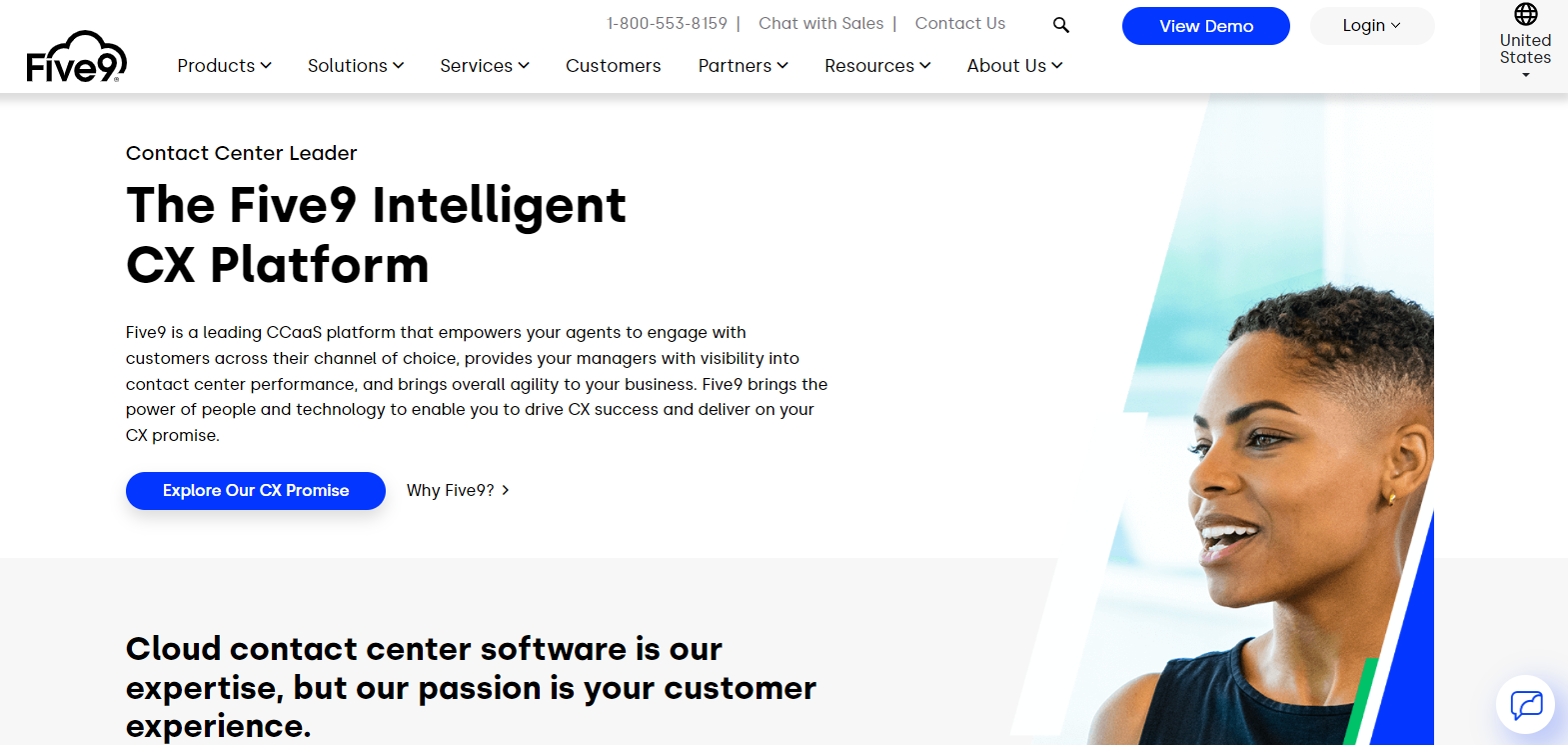
Five9 is a highly regarded cloud-based contact center solution that helps businesses deliver exceptional customer support across various channels. Five9’s advanced features like automatic call distribution and predictive dialing enhance agent productivity and customer satisfaction.
Features:
- Automatic Call Distribution (ACD)
- Predictive, Progressive, and Power Dialing
- Interactive Voice Response (IVR)
- Call Recording and Quality Monitoring
- Real-time and Historical Reporting
- CRM Integrations
Pricing:
- Five9 offers $149/ month as a starter pack.
3. Genesys Cloud
Description: Genesys Cloud combines omnichannel routing, workforce optimization, and analytics in a comprehensive contact center solution. It offers a seamless and efficient customer interaction experience with its cloud-based platform.
Features:
- Omnichannel routing
- Workforce engagement management
- Customer journey analytics
- Predictive engagement
- AI-powered automation and self-service
- Real-time dashboards and reporting
Pricing:
- Genesys Cloud offers custom pricing based on specific business requirements.
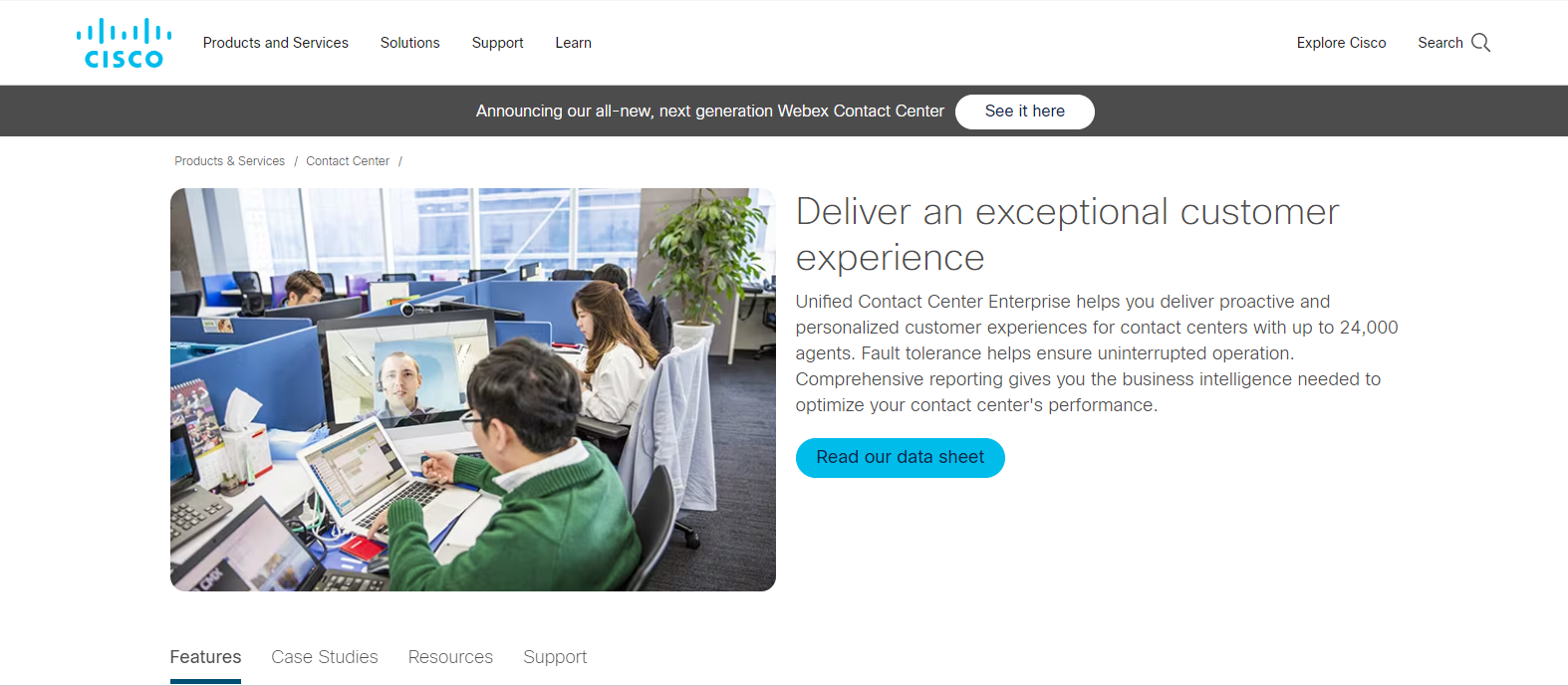
4. Cisco Unified Contact Center Enterprise (UCCE)
Description: Cisco UCCE is an enterprise-grade contact center solution that integrates voice, video, and data communication. It offers intelligent call routing, extensive reporting capabilities, and customer self-service options, making it a robust and reliable solution.
Features:
- Intelligent Contact Routing
- Multichannel Contact Management
- Network-to-desktop Computer Telephony Integration (CTI)
- Real-time Reporting and Analytics
- Workforce Optimization
Pricing:
- Cisco offers custom pricing for UCCE based on business needs and requirements.

5. Mitel MiCloud Connect Contact Center
Description: Mitel MiCloud Connect Contact Center is a cloud-based solution tailored for businesses seeking inbound and outbound call routing, workforce management, and CRM integration to enhance productivity.
Features:
- Automatic Call Distribution (ACD)
- Interactive Voice Response (IVR)
- Call Recording and Monitoring
- CRM Integration
- Workforce Management
- Real-time Reporting
Pricing:
- Mitel offers custom pricing depending on the specific needs of the business.
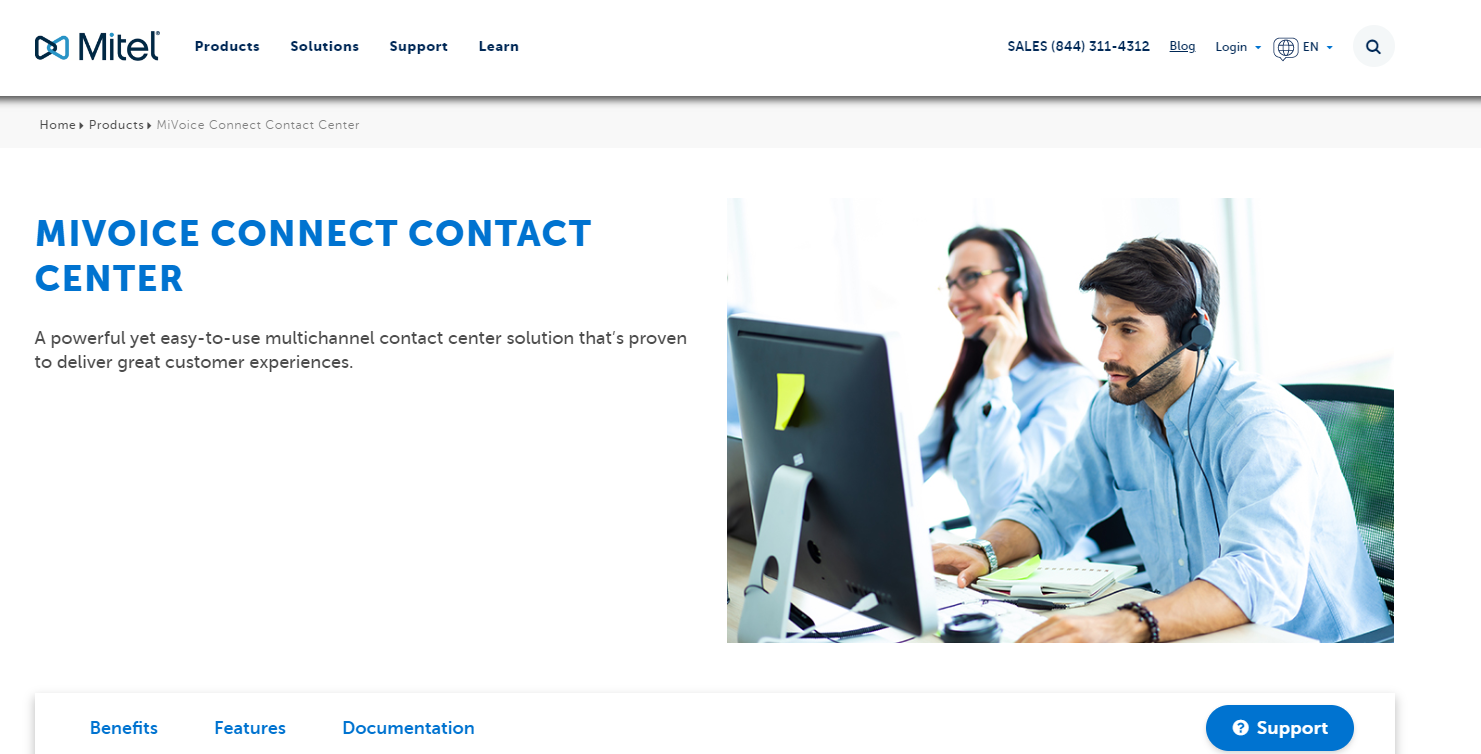
6. NICE inContact CXone
Description: NICE inContact CXone is a robust cloud-based contact center platform that offers omnichannel routing, workforce optimization, analytics, and AI-powered automation, making it a top-tier solution for customer service.
Features:
- Omnichannel Routing
- Workforce Optimization
- Analytics
- AI Automation and Self-Service
- Real-time and Historical Reporting
- CRM Integrations
Pricing:
- NICE inContact offers custom pricing based on the needs of the business, starts at $100/month.
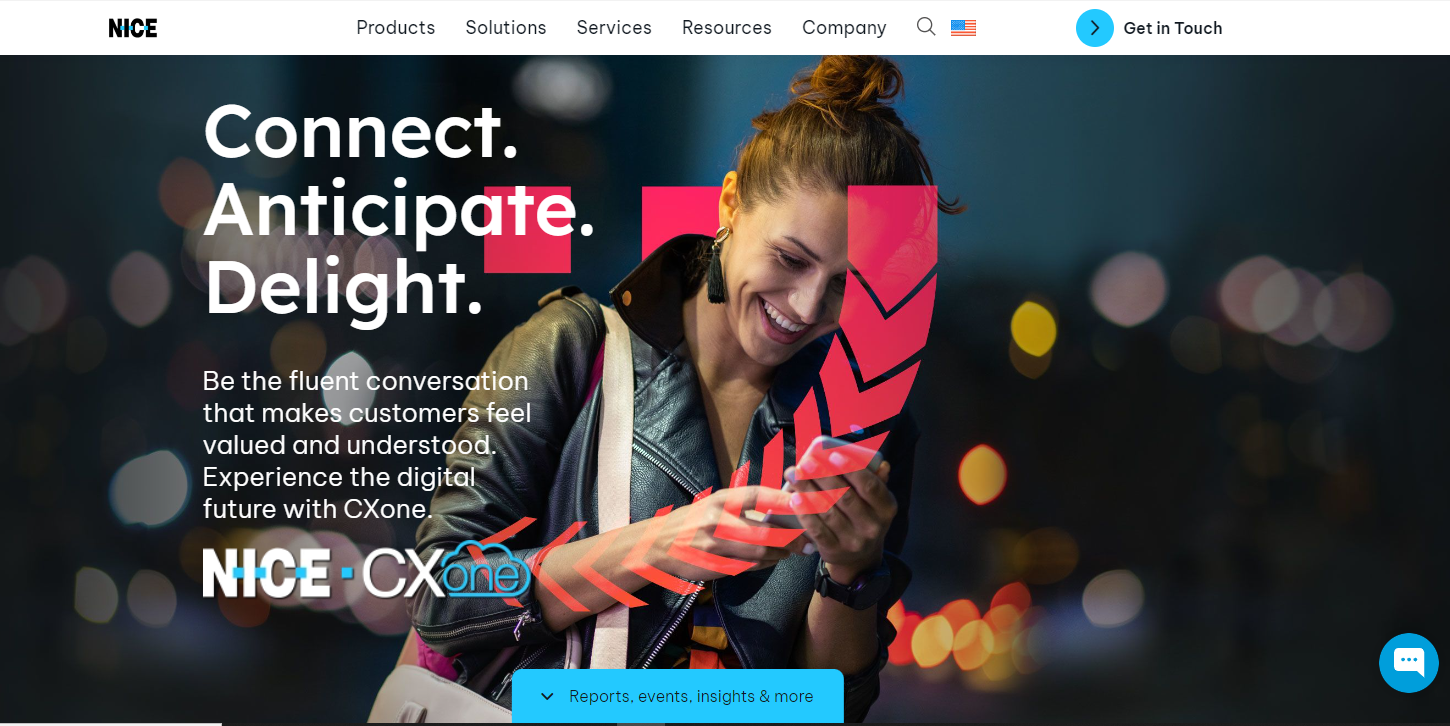
7. RingCentral Contact Center
Description: RingCentral Contact Center is a cloud-based solution packed with features such as automatic call distribution, interactive voice response, and integrated CRM, ensuring seamless customer interactions.
Features:
- Automatic Call Distribution (ACD)
- Interactive Voice Response (IVR)
- CRM Integration
- Real-time Reporting and Analytics
- Omnichannel Communication
- Workforce Management
Pricing:
- RingCentral offers custom pricing based on the specific needs of the business.
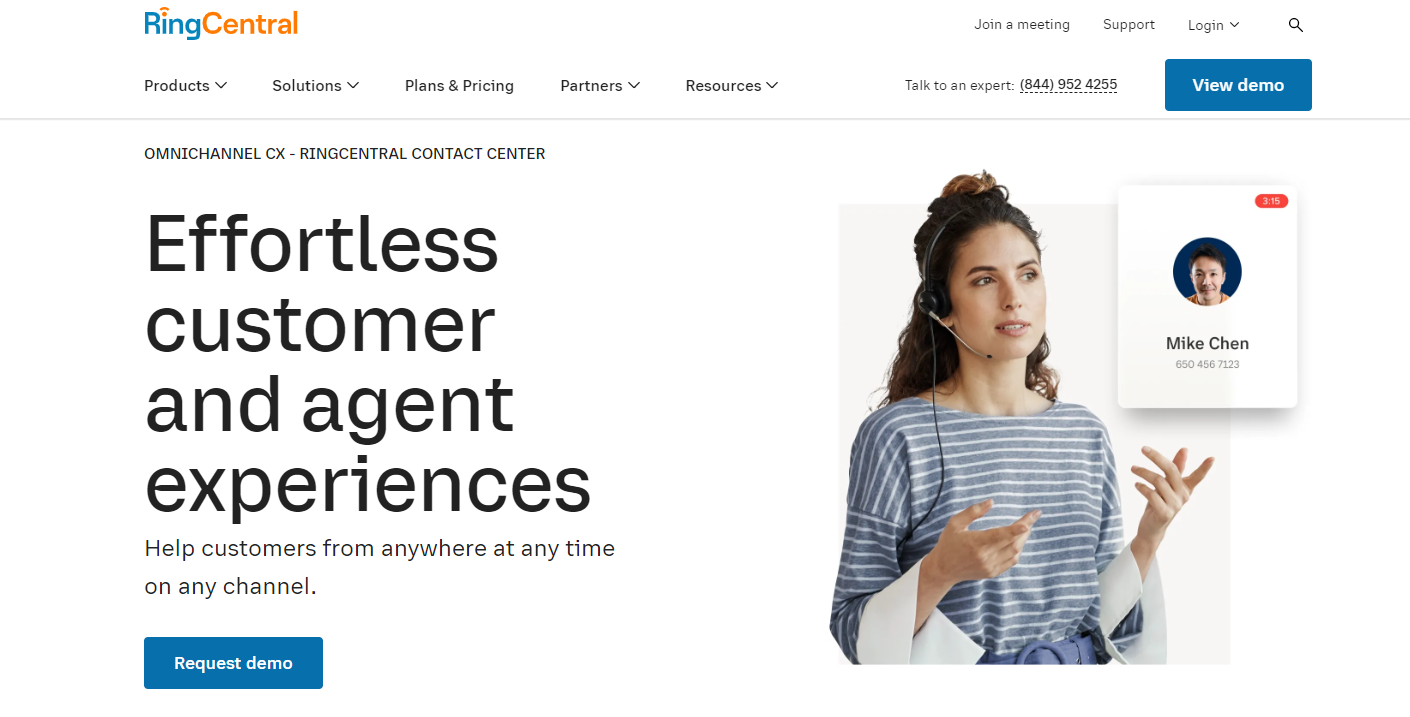
8. Zendesk Talk
Description: Zendesk Talk is a cloud-based call center software that integrates with the Zendesk customer support platform, focusing on improving customer service through efficient call routing, IVR, call recording, and analytics.
Features:
- Call Recording and Monitoring
- IVR and Automatic Call Distribution
- Voice Mail and Callback
- Real-time Analytics
- Integration with Zendesk Support
Pricing:
- Zendesk Talk starts at $49/month for Suite Team.
- Suite Growth – $79/ month
- Suite Professional – $99/ month
- Suite Enterprises – $150/ month
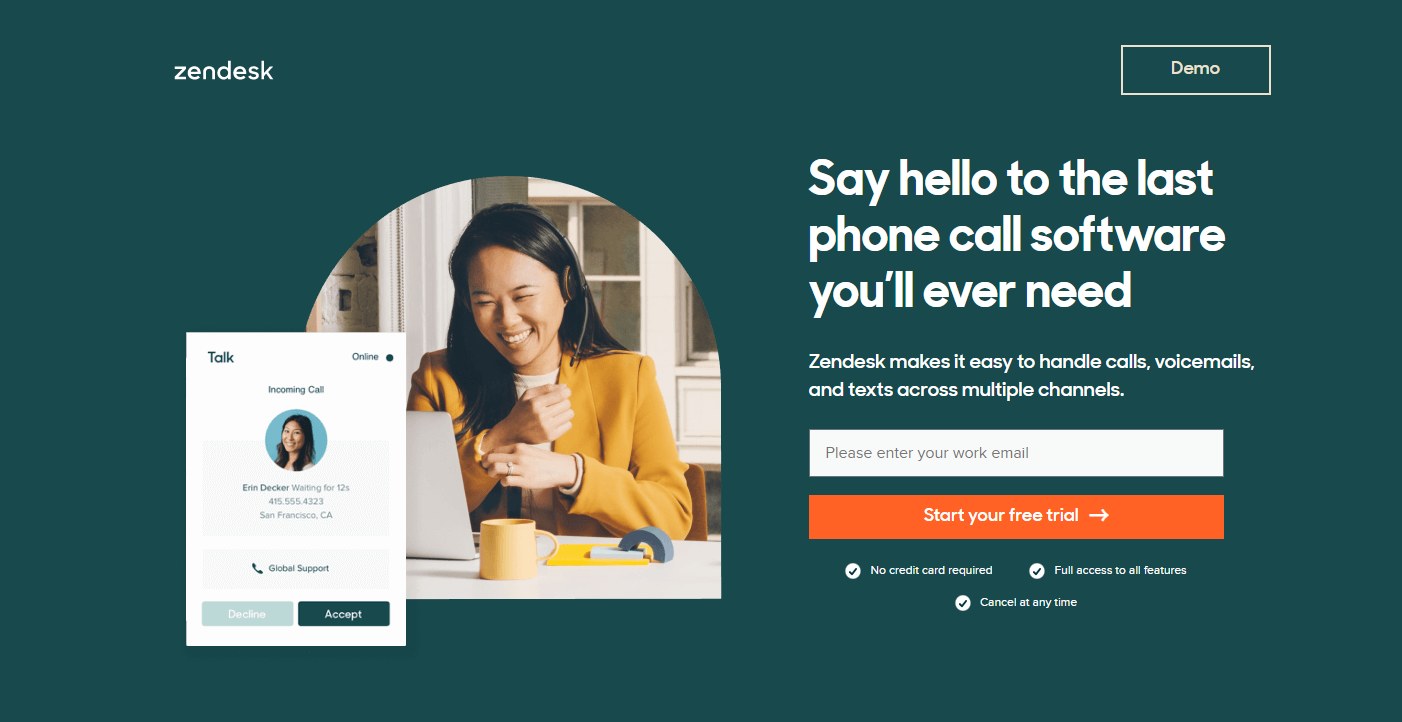
9. Aspect Via
Aspect Via is a cloud-based contact center solution that provides omnichannel customer engagement, workforce optimization, and analytics for improved customer experiences.
Features:
- Omnichannel Customer Engagement
- Workforce Optimization
- Self-Service IVR
- Predictive Dialing
- CRM Integrations
- Real-time Reporting and Analytics
Pricing:
- Aspect Via offers custom pricing based on the specific needs of the business.
10. Amazon Connect
Description: Amazon Connect is an AWS cloud-based contact center service that enables businesses to deliver exceptional omnichannel customer experiences. It is scalable and cost-effective, offering features like automatic call distribution, interactive voice response, and real-time analytics.
Features:
- Automatic Call Distribution (ACD)
- Interactive Voice Response (IVR)
- Real-time and Historical Analytics
- Scalability
- Integration with AWS services
- Contact flows for personalized customer experiences
Pricing:
- Amazon Connect follows a pay-as-you-go pricing model based on usage, with no upfront costs or long-term commitments.
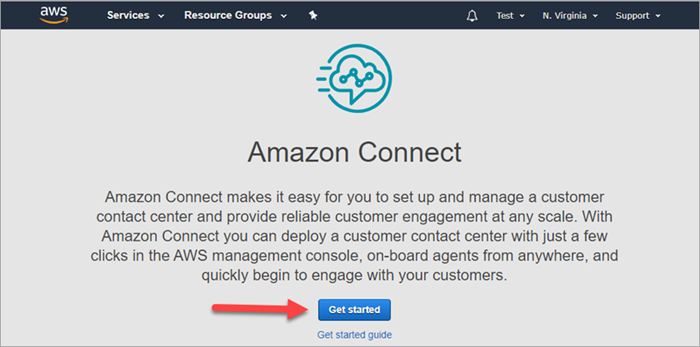
What to Look for in a Phone System?

When choosing a phone system for your business or organization, it’s important to consider various factors to ensure that the system meets your communication needs and enhances efficiency. Here’s what to look for in a phone system:
- Scalability: As your business grows, your communication needs will change. Look for a phone system that can easily scale up or down to accommodate changes in the number of users and call volume.
- Reliability and Quality: Ensure that the phone system provides high-quality voice communication without disruptions. Check the provider’s reputation and ask for uptime guarantees to ensure your phone system will be reliable.
- Features: Identify the features that are essential for your business operations. These may include call forwarding, call recording, conference calling, voicemail, auto attendant, and Interactive Voice Response (IVR).
- Integration with Other Systems: The ability to integrate your phone system with CRM software, email, and other business applications can be crucial for improving productivity and customer service.
- Cost and Pricing Structure: Evaluate the pricing structure to ensure it fits within your budget. Be sure to consider not only the monthly or annual costs but also any installation or setup fees, as well as the cost of additional features or services.
- Mobility and Remote Access: If your team members work remotely or are often on the move, a phone system that supports mobile devices and remote access will be vital.
- Ease of Use and Management: The phone system should have an intuitive interface that is easy for both users and administrators to navigate. This includes ease of adding new users, configuring settings, and managing features.
- Security and Compliance: Security is crucial, especially if you are dealing with sensitive customer data. Ensure the phone system has strong security measures in place, and check if it complies with industry regulations like HIPAA or GDPR.
- Customer Support and Service: The level of customer support provided by the vendor is an important consideration. Ensure that you can easily reach support and that they have a history of providing excellent service.
- Type of Phone System: Determine whether a traditional landline, VoIP, or cloud-based phone system best suits your needs. While traditional landlines may offer reliability, VoIP and cloud-based systems often provide more features and flexibility at a lower cost.
- Redundancy and Disaster Recovery: Check if the phone system has built-in redundancy and disaster recovery options to ensure continuity in case of outages or other unforeseen events.
By taking these factors into account, you will be well-equipped to choose a phone system that not only meets your current communication needs but also supports the growth and evolving demands of your business.
Final Thoughts and Future Trends in Call Center Phone Systems

As technology continues to advance, call center phone systems will likely become more sophisticated, offering even more features and integration abilities. As you choose a phone system for your call center, keep these future trends in mind and consider how they might impact your operations.
In conclusion, selecting the right phone system for your call center is crucial in providing quality service to your customers, improving team productivity, and ultimately driving business success. Among the many options available, partnering with a reliable and innovative company like Ubique Digital Solutions can be the game-changer you need. With their cutting-edge technologies and client-centered approach, Ubique Digital Solutions ensures seamless, efficient communication tailored to your specific needs. Don’t let your business lag behind in this rapidly evolving digital era. Give your call center the advantage it deserves and partner with Ubique Digital Solutions today. Propel your business to new heights in 2023 and beyond. Contact us now to learn more about our customizable solutions and let’s start your journey to success together.
FAQs
Q: What is the best phone system for small call centers?
The best phone system for small call centers is often one that offers a good balance of features and cost. It should have high call quality, reliable service, and the necessary features for efficient operation, such as call routing and analytics. Some of the phone systems reviewed in this article might be suitable for small call centers, but the ultimate choice will depend on your specific needs and budget.
Q: How much does a call center phone system typically cost?
The cost of a call center phone system can vary widely depending on the size of your operation, the features you require, and the provider you choose. Some systems charge a flat monthly fee per user, while others may have additional costs for add-on features or services. It’s important to fully understand the pricing structure before making a decision.
Q: Are there any free call center phone systems?
While there might be some free or low-cost phone systems available, they often lack the features and reliability of paid solutions. Remember, you often get what you pay for. Therefore, it’s crucial to consider the potential drawbacks before opting for a free system.
Q: How to set up a call center phone system?
Setting up a call center phone system generally involves choosing a provider, setting up your hardware and software, configuring your system settings (such as call routing and IVR menus), and training your staff. Most providers offer support during the setup process and some even offer fully managed setup services.
Q: Can a call center phone system integrate with CRM software?
Yes, many modern call center phone systems can integrate with CRM software. This can help streamline operations, as agents can have relevant customer information at their fingertips during calls. Before choosing a phone system, check to see if it’s compatible with your current CRM software.






